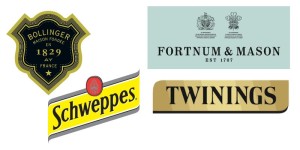We have all become accustomed to seeing Royal coats of arms on popular products. But what exactly is The Royal Warrant? Who decides which companies should get one and how will things change now that Prince Charles has become Charles III?
What is The Royal Warrant?
According to Royalwarrant.org “it is a document that permits a company to use the Royal Arms in connection with its business in an appointed trading capacity. It is granted for up to five years at a time as a mark of recognition for the supply of goods or services to the Royal Household.” When those five years come to an end, the company can re-apply.
So essentially, it is a subtle mark of endorsement for businesses which meet strict criteria. Plus they supply goods and services to the royals, although purchases are also made from other sources. It’s worth noting however, that they are not issued to professional businesses such as law firms. The company or individual, known as ‘The Grantee’ is responsible for the correct use of the relevant Royal Arms.
What sort of companies qualify for a Royal Warrant?
To be awarded a Royal Warrant, their are strict criteria. The grantee must have displayed dedication to the highest levels of craftsmanship, quality, service and excellence in their field. Firms are eligible if they supply products or services on a regular and ongoing basis to the Royal Households for not less than five years out of the past seven.
How many Royal Warrants are granted each year?
Around 30 are granted a year, but around the same number are withdrawn.
Who decides which businesses are awarded Royal Warrants?
They are granted directly by members of the British Royal Family or their households to individuals or companies who supply them with goods or services. The Monarch decides who may grant Royal Warrants. In recent years, these have included The Queen, The Duke of Edinburgh and The Prince of Wales (now King Charles III). King Charles may well decide to add more ‘grantors’. It is likely that these will be Prince William or The Queen Consort, Camilla. Then they in turn, will be able to designate new Royal Warrant holders.
What is on Queen Elizabeth II’s Warrant?
This contains the famously distinctive royal coat of arms. This depicts the lion of England, unicorn of Scotland and a shield divided into four quarters. This is then followed by the words “by appointment to Her Majesty the Queen”. Prince (now King) Charles’ Warrant displays feathers, while the late Duke of Edinburgh’s depicted his coat of arms with distinctive supporters.
What will happen now that Prince Charles has become King Charles III?
When there is a change of Monarch, the Royal Household will review warrant grants. Royal Warrants automatically expire on the death of the Royal who granted them. Grantees have up to two years to remove the coat of arms from their products, vehicles and stationery. Now that Queen Elizabeth II has passed, hundreds of firms will have to reapply to bear the royal crest in their products. This is because more than 620 warrants passed with her.
The Royal Warrant Holders Association said: “Amongst other things, applicants are also required to demonstrate that they have an appropriate environmental and sustainability policy and action plan.” It will certainly be interesting to see which businesses are granted the Royal Warrant by King Charles. He is well-known for his passionate advocacy of environmental issues, so perhaps new holders will reflect those interests.The 180 warrants that Charles issued when he was Prince of Wales will continue now that he is King. This is because they go with the household, not the title.
How many businesses have a Royal Warrant?
At present, there are around 875 holders of Royal Warrants of Appointment, which are held by around 800 individuals or companies or individuals. However, this changes almost monthly.
Which businesses have a Royal Warrant?

Popular brands with the Royal Warrant
Here are a few well-known brands that have been granted a Royal Warrant:
Coca Cola
Scweppes
Cadbury
Heinz
Fortnum and Mason
Twinings
Waitrose
Cartier
Martini
Bollinger

Royal warrants are granted to many well known brands
So keep an eye out for which new companies are granted Royal Warrants, and ask yourself about the criteria they have met in order to signify the aspirations of the new monarch King Charles III
If you are interested to find out if there was ever a coat of arms associated with your own surname, click here and enter your surname in our search box.
To read more blogs about heraldry, click here.
To view our product range, click here.



